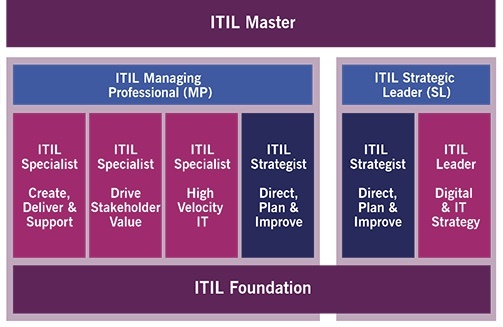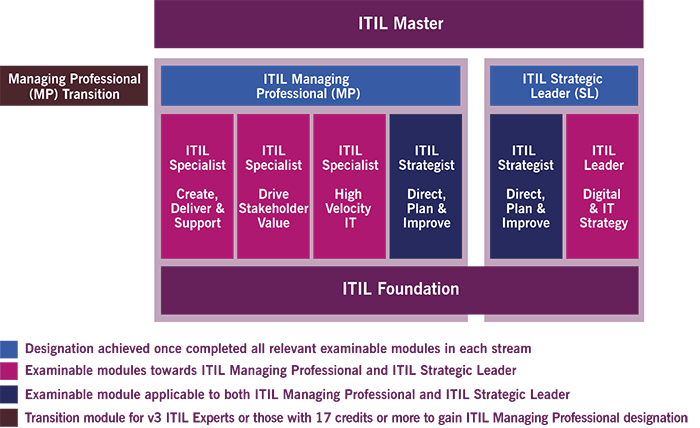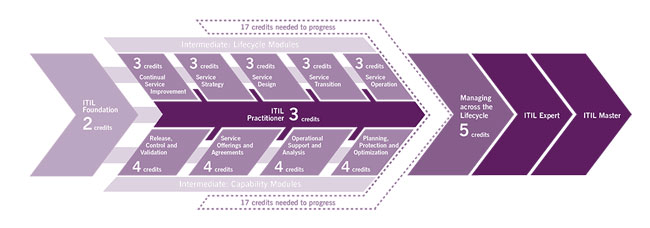
If you want to advance into an IT manager or higher role, earning ITIL Foundation certification will be crucial.
There are many reasons why an ITIL certification will benefit your career. One of the top reasons is it demonstrates your competence and leadership in IT Service Management.
The ability to understand and apply the practices from ITIL is a quality of a great IT manager. The credential also looks great on your resume and is a key talking point during interviews if you are job hunting.
I successfully passed the ITIL Foundation v3 (2011) certification exam in 2013. The main reason I earned the ITIL credential was to enhance my resume for a position at one of the big four IT consulting firms.
For reference, ITIL Foundation concepts under Strategy Strategy and Service Design came up during each of my nine rounds of interviews. There were similar questions when I interviewed for a position at another company. They were interested in my perspective on how I would approach the different lifecycle phases. This includes setting an IT strategy, enabling it through design and development, and finally supporting it long-term.
What I’ve learned through these experiences is that understanding ITIL practices will benefit you in any IT role.
It also goes to show why ITIL certification is so widely popular when it comes to IT management
If a company has systems enabling the business, there’s a good chance ITIL practices are in practice. These practices help to further improve IT Service Management (ITSM) capabilities for the company.
What is ITIL?
Many think ITIL is focused on IT Help Desk functions around how to keep systems up and running. While this is part of it, ITIL is about understanding everything from defining IT strategy to providing support to keep systems operational. It truly is the global ITSM framework.
ITIL is an open framework started by the UK government as a way for the government and companies to define standards and practices for how IT organizations should operate.
It has since become an internationally recognized IT certification due to ITIL’s broad application in any region or industry.
Since 2013, the ITIL framework and practices are officially under the ownership of Axelos. They are a leading practices company which also provides support for PRINCE2 Project Management and Agile.
The ITIL framework is described as the following:
The Information Technology Infrastructure Library (ITIL) defines the organizational structure and skill requirements of an information technology organization and a set of standard operational management procedures and practices to allow the organization to manage an IT operation and associated infrastructure. The operational procedures and practices are supplier independent and apply to all aspects within the IT Infrastructure.
Source: ITIL
Latest ITIL Version
ITIL 4 officially came into publication in February 2019. This is the first major update since ITIL v3 was published in 2007, which was later revised as ITIL 2011.
ITIL 4 builds upon and transforms the previous IT Service Management topics covered in ITIL v3. Major differences between ITIL v3 and ITIL 4 include:
- Greater focus on the definition of value streams through the ITIL Service Value System (SVS). This is about how business and IT organizations can partner to create and deliver value.
- Extends beyond traditional ITSM and into the delivery and support of modern technologies. Businesses are rapidly shifting how technology is purchased and where it’s managed. Moving more business to the cloud at an accelerating pace requires a shift in how IT supports these new technologies.
- Defines operating models for emerging agile and digital transformation practices. Business leaders expect more flexibility and faster response times from IT. The way we operate needs to shift to enable this need.
Below is a summary from Axelos on ITIL 4:
ITIL 4 expands on previous versions by providing a practical and flexible basis to support organizations on their journey to the new world of digital transformation. It provides an end-to-end IT/digital operating model for the delivery and operation of tech-enabled products and services and enables IT teams to continue to play a crucial role in wider business strategy.
Source: Axelos
You may be wondering when Axelos will phase ITIL v3 out. Since new content is still rolling out, the transition from ITIL v3 to 4 will be gradual. Axelos has committed to continue supporting ITIL v3 certification exams and publications through June 2020.
Levels of ITIL Certification
There have been several updates in the ITIL certification path in 2019. However, the only certification that has been updated so far is ITIL 4 Foundation. ITIL 4 publications for other certification levels (Specialist, Strategist, and Leader) will begin arriving in the second half of 2019.

- Foundation: This is the starting place for all ITIL practitioners. This is where you learn the basics of ITIL practices.
- Specialist: The three modules under
ITIL Specialist are Create, Deliver, & Support, Drive Stakeholder Value, and High Velocity IT. Passing these modules is required to achieve the Managing Professional designation. - Leader: The only examinable module under ITIL Leader is Digital & IT Strategy. Passing this module is required to achieve the Strategic Leader designation.
- Strategist: There is only one module under ITIL Strategist which is Direct, Plan, & Improve. Passing this module is required to achieve either the Managing Professional or Strategic Leader designations.
- Master: This is the top designation you can achieve in ITIL. It can be earned by completing all certifications across the Management Professional and Strategic Leader designations.
As part of ITIL 4, they have also introduced two separate designation streams based on the exam modules you complete:
- Managing Professional (MP): The ITIL MP is primarily for those responsible for managing the operation of IT organizations. This includes understanding how to run projects and IT teams effectively.
- Strategic Leader (SL): The ITIL SL is a new designation for ITIL 4. It is meant to extend beyond the day-to-day ITSM operations under the MP designation. This practitioner is able to set the strategic direction for all technology services to enable business objectives.
Certification Transfer from ITIL v3 to ITIL 4
The content has materially changed from the latest ITIL version published in 2011. ITIL 4 introduces new concepts and practices which were not previously addressed, but are important to the framework. This raises the question, “will my current ITIL v3 certifications transfer over to an ITIL 4 certification?”
The short answer is no. However, Axelos will provide options for transitioning to the new ITIL 4 designations if you are on the path to ITIL Expert.
Here is a breakdown of what you will need to do for ITIL 4 if you’re coming from ITIL v3:
ITIL Foundation v3 Certified: You will need to take the ITIL 4 Foundation exam to earn certification. The content and practices between the two versions changed enough to make this necessary. There is no way around having to re-certify for ITIL 4 Foundation. However, you can use the credits earned to take the Managing Professional (MP) instead (see below).
ITIL Expert Certified: If you are an ITIL Expert, there will be a module to transition to a Managing Professional (MP) in ITIL 4. You still need to understand the new ITIL practices, but at least you don’t have to sit for the other exams. This ITIL MP transition module will come out later this year.
Earning Credits for ITIL Expert: If you have earned credits towards the ITIL Expert certification, you can transfer them towards the Managing Professional (MP) designation. You need 17 credits before sitting for the MP Transition exam.
Below is the path to earning the 17 required ITIL certification credits.

ITIL Foundation Service Lifecycle Stages
Even though ITIL 4 is rolling out, the stages of the IT Service Management (ITSM) Lifecycle and other core elements will be similar to what’s in ITIL v3 (2011). However, we’ll continue to update this guide as more guidance is provided on ITIL 4.
While there are some changes, there is still great value in understanding the key concepts from ITIL 2011.
At a high level, here are the five (5) ITIL Service Lifecycle Stages and key components.
1. Service Strategy
- Service Portfolio Management
- Business Relationship Management
- Financial Management for IT Services
2. Service Design
- Design Coordination
- Service Catalogue Management
- Service Layer Management
- Availability Management
- Capacity Management
- Service Continuity Management
- Supplier Management
3. Service Transition
- Transition Planning & Support
- Change Management
- Release & Deployment Management
- Asset & Configuration Management
- Knowledge Management
4. Service Operations
- Functions
- Service Desk
- Technical Management
- Application Management
- IT Operations Management
- Processes
- Event Management
- Incident Management
- Problem Management
- Request Fulfillment
- Access Management
5. Continuous Service Improvement
- Improvement Processes
In ITIL 4, the IT Service Management Lifecycle does go through some changes. The ITIL Processes and Functions are now being called Practices. There are also now four (4) Dimensions and seven (7) Principles of IT Service Management.
Most ITIL 4 Foundation training will cover how the ITIL v3 content maps to the newly added content in ITIL 4.
Recommended ITIL Foundation Training
While the number of courses and training providers for ITIL v3 is much larger, some training has started to appear for ITIL 4 Foundation.
It is recommended to start with ITIL 4 if you intend to get certified at the higher levels like Managing Professional (MP).
However, if you primarily want to earn ITIL Foundation certification, then you would be fine sticking with getting ITIL Foundation v3 certified.
This exam does count towards the 17 credits if you want to take the ITIL Managing Professional (MP) Transition Exam. It’s expected this exam will be available later this year.
ITIL 4 Foundation Training Recommendation
- ITIL 4 Foundation Certification Course: Pink Elephant is one of the first training providers to have curated a course for ITIL 4 Foundation. They cover all of the new ITIL Foundation practices and the main differences in the versions. You will be well prepared for the exam after taking this engaging training. The course includes an ITIL 4 Foundation exam voucher.
ITIL v3 Foundation Training Recommendation
- ITIL Foundation Certification Training: This is the ultimate ITIL Foundation v3 training course that covers everything you need to know to pass the exam. The training includes 16 hours of instructor-led and 24 hours of self-paced learning. To help you retain the knowledge, there are case studies, real-world examples, and practice questions that are similar to what’s on the exam. The course also includes an ITIL v3 Foundation exam voucher so you’ll be encouraged to follow through.
- ITIL Lifecycle Expert Program – Master’s Program: If you’ve already passed the ITIL Foundation exam, you’re should be working towards the ITIL Expert certification. This will be important if you want to transfer to an ITIL 4 Managing Professional (MP) once it becomes available. This Master’s Program course will greatly expedite your path to ITIL Lifecycle Expert certification. You will receive an exam voucher and a certificate upon completion of the following six (6) ITIL Intermediate courses covering the ITIL Lifecycle Stages:
- Service Design (SD)
- Service Operation (SO)
- Service Strategy (SS)
- Service Transition (ST)
- Continual Service Improvement (CSI)
- ITIL Managing Across the Lifecycle (MALC)
Topics Covered on the ITIL v3 Foundation Exam
- Functions, Processes, & Practices
- Generic Concepts & Definitions
- Key Principles & Models
- Roles
- Service Management Practices
- Technology and Architecture
- Service Lifecycle
ITIL Foundation Exam Format
- 60 minutes duration
- 40 multiple choice questions
- 26 out of 40 (65%) correct to pass
The exam format is similar to other IT certification exams. The ITIL Foundation exam lasts 60 minutes and is closed book with no notes.
It consists of 40 multiple choice questions. Most questions have at least two similar answers, so you’ll want to pay close attention.
In order to pass the ITIL Foundation exam, you’ll need to get at least 65% correct (26 out of 40).
How to Register for ITIL Certification
There are two paths to the ITIL Foundation exam. The first is by taking an ITIL Foundation Certification Training course which includes a voucher for the exam at the end.
The second, is to register directly with PeopleCert if you are ready to take the exam.
ITIL Foundation Certification Exam Cost
ITIL Foundation certification exam cost is $363 from PeopleCert.
Higher level ITIL certification exams, like ITIL Practioner, will cost between $399 and $469. Also, ITIL Foundation training costs will vary depending on the provider. We’ve recommended the courses above based on their cost-to-value.
Tips for Passing the ITIL Foundation Exam
- Commit ITIL definitions to memory. This is going to be extremely important. Several questions and answers will be worded to trick you using similar terms, so you need to know the terms.
- It is best to understand how terms and definitions fit within the ITIL framework. Everything within ITIL is interlinked and understanding the relationships is important.
- Try to relate ITIL concepts to real examples from your experience. This will help during the exam.
- Take an online ITIL Foundation training course. Our recommended course is the ITIL Foundation Certification Training on Simplilearn.
- Take practice exams before the real one. There are fewer ITIL 4 practice tests out there, but the core ITIL version 3 concepts carry over to version 4.
Conclusion
The ITIL framework for IT Service Management is changing in 2019. There is a big shift in content from ITIL v3 to 4 due to emerging technologies and service delivery methods. IT concepts like Agile, Digital, Cloud, DevOps, and others are driving the change within the new ITIL 4 practices.
While the ITIL 4 Foundation certification is now available, the other levels are expected later in 2019. Axelos is not planning to retire ITIL v3 publications and exams until mid-2020. So now is the best time to earn the 17 ITIL credits so you can take the ITIL 4 Managing Professional (MP) Transition Exam once it comes out.
If you’re only looking to get Foundation certified, it still makes sense to take the ITIL v3 training and get certified. However, if you’re just starting on your path to higher ITIL certification levels, we recommended starting with ITIL 4 Foundation training.
This should cover all the key things you need to know to earn ITIL Foundation certification.
Already on your journey to ITIL certification? Leave us a comment to let us know how it’s going and share any tips you have for passing the exam.





Thank you for pointing out that an ITIL certification is ideal for those who are looking to advance their career in IT. It makes sense for an IT professional to take up this course as it helps improve their skills. Assuming I am an IT professional and would like to advance in my career, I would definitely take up this course so that I will be able to widen and expand my horizon.
Hi Kristofer, I couldn’t agree more. Getting ITIL certified helped me understand the core aspects of various technology practices when I was just starting out. Since then, having the certification listed on my resume/CV helped me secure at least two jobs. Employers are looking for ITIL, especially for management level positions.